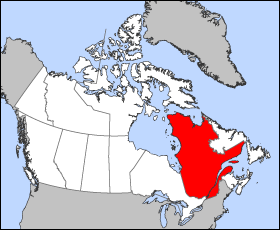UnNews:Quebec abandons bid for sovereignty
11 March 2007
In an astounding turn of events today, the province of Quebec has announced that they are pulling their bid for sovereignty amid concerns about increasing projected costs.
The announcement was made at a joint press conference held by Quebec premier Jean Charest and Quebec City mayor Andrée Boucher in Quebec City earlier today.
André Boisclair, the leader of the official Quebec sovereignty bid committee, the Parti Québécois, said Quebec has lost a prime opportunity to bring their majority francophone population the recognition it deserves.
"Je suis très déçu par la décision de Monsieur Charest. Nous aurions eu une très bonne chance de gagner la souveraineté bientôt si nous avions maintenu notre candidature. Je suis simplement choqué," Boisclair said in an official statement today, specifically stating that his comments were not to be translated into English, "la langue inférieure".
Quebec has been Canada's official candidate for secession since the early 1960s, when the bid committee was first formed by the Front de libération du Québec (FLQ), despite having to defend its title against Alberta separatists in the 1980s. The Parti Québécois officially took over the bid committee in 1968.
In this latest round of bidding, Quebec was competing against rival bids from Tibet in the People's Republic of China, Chechnya in the Russian Federation, and Tamil Eelam in Sri Lanka for the right to secede from their respective countries.
Charest said the decision to withdraw Quebec's bid was motivated by a review of post-secession costs that have plagued previous winners.
"If you look at other countries that have had successful bids for secession, you see that it simply isn't economically viable in the long term," Charest told reporters at the news conference.
He specifically cited the examples of East Timor and much of the former Soviet Union, which have seen economic ruin, corrupt governments, and civil unrest, in some cases leading to violence, continue for years after successfully seceding. Charest also mentioned that the federal government's financial commitment to the bid, set at C$0, was too low.
Boisclair retorted these statements, saying that Charest's examples were simply not relevant to Quebec's situation.
"Nous ne sommes pas le Timor oriental ou le Tadjikistan," Boisclair said. "Nous sommes le Québec, et nous avons les moyens nécessaires d'être indépendant."
Canadian Prime Minister Stephen Harper also weighed in on Charest's second argument.
"I can guarantee you that if Quebec were to separate, not only would they not receive funding from the federal government, but they would also stop receiving equalization payments," Harper said.
Sources[edit | edit source]
- Canadian Press "Canada abandons 2014 Commonwealth Games bid" CTV, March 8, 2007
- "Jeux du Commonwealth : Halifax retire son appui" Radio-Canada, le 9 mars, 2007
